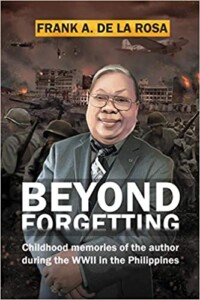Title: Beyond Forgetting
Author: Frank A. de la Rosa
Publisher: Shunduay Publishing
ISBN: 1734964545
Genre: Memoir
Pages: 128
Reviewed by: David Allen
Read Book Review
On the dedication page of this memorable journey through the life and times of a son of the Philippines, the author writes: “Through the memoir, I hope to inspire you to look beyond the challenges you are currently facing,” and “…obstacles…should not stop you from believing that good things are yet to come.”
Frank de la Rosa, the author of Beyond Forgetting, delivers. He admirably succeeds at inspiring readers with the object lessons of a life dedicated to careful observation, respect for nature, and compassion for animals and his fellow man.
The story unfolds in the island town of Panganiban, Phillippines, in a lush tropical setting where rice and fruit grow abundantly. Frank de la Rosa artfully describes his childhood and later years working the family farm, where rice fields are “…a sea of green” turning into “shimmering gold” by harvest time. Every part of the coconut, the “tree of life”, has its own use. Farming, a way of life, is a legacy passed on from one generation to the next.
Soon enough we learn that the writer and his family were poor–poor but spiritually and emotionally rich. Harmony with nature is its own deep reward. The bucolic pace and setting are temporarily interrupted by the arrival of the aggressive Japanese soldiers during World War II, but some of de la Rosa’s memories from that time are likewise nostalgic.
To his great surprise, de la Rosa realizes that despite the typecasting, the Japanese were really friendly to children. Frank de la Rosa’s family dealt with exigencies by taking to the hills, where survival and making do were the order of the day.
Frank de la Rosa went on to study agricultural engineering at the University of California Davis. In this excellent book, he serves up a veritable banquet of insider commentary on farming, on the land, and on the animals who helped till the land. Carabaos (domesticated water buffalo) were used by the vaqueros (cattle drivers, or cowboys) in many aspects of farming. Tagalog was spoken. The reader becomes familiar with this language through its skillful and parsimonious use in driving the narrative forward. Episodes of life-saving folk and herbal medicine cures are recounted, all in the service of making the narrative real, gripping, and vivid. Marriages are arranged. No one is left behind!
The de la Rosa family is a major presence in this book, including his brother and his Nanay (mother) and Tatay (father.) Time and again, the family is the wellspring from which warmth, generativity and resilience spring.
The book succeeds on many fronts. It is thorough, moving, and heartfelt. The narrative voice is conversational and always human. Readers can feel the life of the soil and feel the sun rising and setting on verdant fields of casava, coconut, and rice. The balance of nature and of a life well lived are expertly expressed in these pages. Memoirs like this serve as a reminder of who we are, where we come from, and what we hope to preserve.



Follow Us